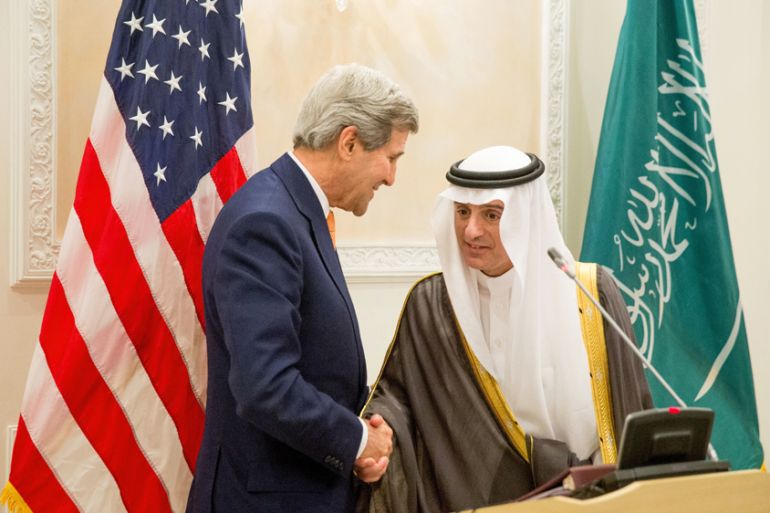S Arabia says king’s Camp David absence not snub to US
King Salman to send crown prince and defence minister to summit in what some say is snub over US-Iran rapprochement.

Saudi Arabia’s new foreign minister has said that King Salman’s last-minute decision not to attend a Camp David summit of US and allied Arab leaders later this week was not intended as a snub to Washington.
“This is not related in any way, shape or form to any disagreement between the two countries,” Foreign Minister Adel al-Jubeir told reporters on Monday at Saudi Arabia’s embassy in the US capital.
In a statement on Sunday, Jubeir had said Thursday’s summit coincides with a humanitarian ceasefire in the conflict in Yemen, where a coalition of Arab nations are fighting Houthi rebels.
The announcement was interpreted by some as a deliberate rebuff to US President Barack Obama, at a time when ties between the allies have been strained by Saudi opposition to a proposed US nuclear deal with Iran.
But Jubeir, until recently the Saudi ambassador to Washington, said this idea was “really off base” and that the replacement delegates were “the right people” to represent Riyadh at the meeting in Maryland.
The foreign minister said Crown Prince Mohammed bin Nayef, who is also interior minister, would lead the Saudi delegation and the king’s son, Deputy Crown Prince Mohammed bin Salman, who is defence minister, will also attend.
In a statement on Monday, the White House said the king had called US President Barack Obama to “express his regret at not being able to travel to Washington”.
Presidential retreat
Obama had planned to meet King Salman one-on-one a day before the gathering of leaders at the presidential retreat.
|
|
| Yemen war dominates GCC summit in Riyadh |
The Kingdom of Bahrain said separately that its delegation would be headed by the country’s crown prince, Salman bin Hamad Al Khalifa.
The sultan of Oman, Qaboos bin Said, is among those staying away.
The sultanate will be represented instead by the deputy prime minister, Sayyid Fahd bin Mahmoud Al Said, and other officials, the country’s official news agency announced.
Health issues will also keep the president of the United Arab Emirates, Sheikh Khalifa bin Zayed Al Nahyan, from attending. He suffered a stroke in January last year and has not been seen publicly since.
The influential Abu Dhabi crown prince, Sheikh Mohammed bin Zayed Al Nahyan, will lead the Emirati delegation.
Among those who will be at the summit is the Kuwaiti emir, Sabah Al Ahmad Al Sabah, who arrived at Andrews Air Force Base on Monday, the official Kuwait News Agency reported.
Qatar’s emir, Sheikh Tamim bin Hamad Al Thani, is scheduled to depart Monday to take part in the meeting.
‘No substantial disagreement’
The White House said on Sunday it did not take the Saudi king’s decision to skip the summit as a sign of any substantial disagreement with the US, but some commentators called the king’s cancellation a snub.
The New York Times said: “The decision appeared to be a signal of Saudi Arabia’s continued displeasure with the Obama administration over United States relations with Iran, its rising regional adversary.”
Arab allies feel threatened by Iran’s rising influence and worry a nuclear pact taking shape with the US, Iran and other nations may embolden Tehran to intrude more aggressively in countries of the region.
King Salman, who took power in January after his brother King Abdullah died, has not travelled abroad since his ascension to the throne.